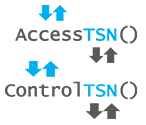Communication across all levels of the automation pyramid is a requirement for many innovative approaches to digitalization of production environments (Industrie 4.0). The current process of adding real-time capabilities to standard Ethernet within the context of Time Sensitive Networking (TSN) is considered to provide the key enabling technology. In order to use the advantages and value added efficiently, a uniform application interface is required. In the context of the AccessTSN project, an open solution based on real-time Linux is being developed.
Convergent networks, which bring together IT (Information Technology) and OT (Operation Technology), are difficult to implement due to the large number of incompatible field buses and the lack of determinism of traditional IT networks. Currently, IEEE 802.1 enhances the well-established Ethernet with real-time capabilities (Time Sensitive Networking – TSN) and is seen as key technology for convergent networks. TSN is a set of standards that cover different aspects of a deterministic networking.
In order to take advantage of TSN, various functionalities are needed on end devices:
- Time synchronization: A common understanding of time across the entire network.
- Scheduling of packet traffic: TSN offers, for example, a time slot-based approach.
- Configuration: All participants must agree on certain parameters and schedules.
- Synchronization with application layer: The local application must be synchronized with the network.
Today, various open solutions are available for implementing TSN functions. The real-time Linux project “PREEMPT_RT” can be used for either PC-based or embedded platforms. In addition, there is already a large number of implementations of relevant protocols such as time synchronization using “linuxptp”.
In order to implement an application-specific TSN end device based on open solutions, large effort and additional implementations are required. The goal of the AccessTSN project is to solve this in an open, generic and interdisciplinary manner.
Within the scope of the project, a modular TSN driver is developed that enables application-specific instantiation of TSN functions and at the same time abstracts various hardware platforms. The project focuses in particular on application interfacing and scheduling as well as configuration.
With the project results, an efficient use of TSN functionality will be possible in the future without application developers have to worry about the details of the network or scheduling.In order to ensure that the requirements of different stakeholders are taken into account, the project is in active exchange with hardware manufacturers, network equipment providers, end device manufacturers and other open source initiatives. This is done, for example, within the context of testbeds, but interested parties are always invited to participate in the project.
